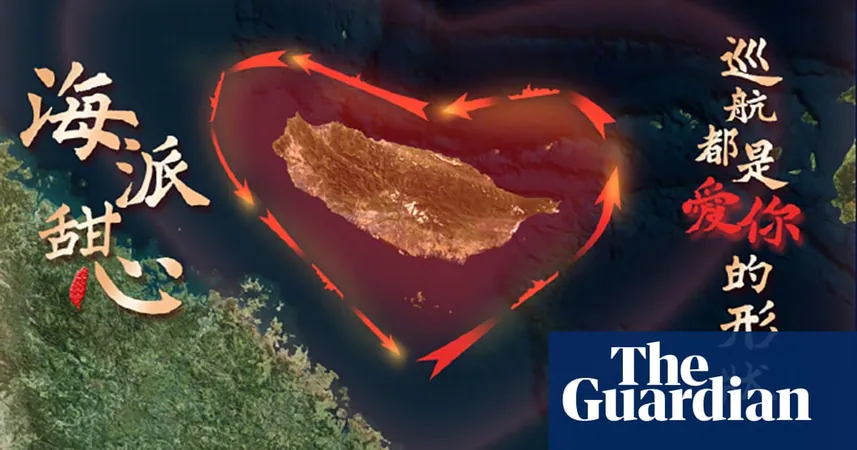
China’s Bizarre Message to Taiwan: Love or Harassment?
2024-10-15
Author: Liam
China’s Peculiar Military Drills
In a peculiar twist during recent military drills, China attempted to convey a friendly message to Taiwan that backfired spectacularly. The message, distributed by the Chinese coastguard, was meant to appear affectionate but instead has been met with widespread condemnation, being labeled as 'weird,' 'creepy,' and even likened to 'sexual harassment.'
The Military Show of Force
On the day of the drills, which began on Monday, China showcased its military prowess by surrounding Taiwan’s main island and outer territories. The operations involved a massive mobilization of warplanes and navy vessels, along with cyber-attacks, aiming to simulate a blockade and potential assault. However, the most striking aspect wasn't the military might itself but rather the accompanying propaganda campaign.
The Heart-Shaped Message
Among a flurry of aggressive imagery—including soldiers in action, warship captains surveying the waters, and boastful commentary about the prospects of 'inevitable reunification' with Taiwan—one piece of content stood out. It was an illustration resembling a heart, created from a satellite depiction of Taiwan’s island. The accompanying text, written in traditional Chinese characters (which are used in Taiwan), read: 'Hi my sweetheart' and 'The patrol is in the shape of loving you.'
Backlash from Taiwan
This heart-shaped depiction was part of what the Chinese coastguard referred to as 'law enforcement patrols' during their military exercises. However, rather than warming the hearts of Taiwanese citizens, the move was met with backlash. Taiwanese coastguard officials described the image as an example of Chinese cognitive warfare that crossed the line into harassment. Critically, the message failed to resonate positively with the audience it aimed to reach.
Social Media Mockery
Taiwanese media outlets picked up on the story, with headlines revealing the widespread mockery and derision the image attracted on social media platforms. Users flooded comment sections with vomit emojis, expressing their disgust. The metaphor of a creepy romance dominated discussions, with some users comparing the sentiment to that of an abusive partner. A local newspaper even labeled the message as 'sexual harassment,' further igniting the fury.
Cultural Connections and Controversies
Adding to the bewilderment was a perceived connection to a long-deceased Taiwanese television show, 'Hi My Sweetheart,' which many speculated was invoked to elicit nostalgia for the show's star, Rainie Yang. The actress has faced significant backlash in Taiwan for her pro-China stance, making the reference more controversial.
Conclusion: The Complexity of Taiwan-China Relations
This bizarre episode serves as a stark reminder of the complex and often strained relationship between China and Taiwan. While Beijing continues to assert its claims over Taiwan, it remains clear that maneuvering public perception is fraught with risks, especially when the tactics appear more like misguided romance than forthright diplomacy. The incident raises questions about the effectiveness of China's softer propaganda efforts and underscores how deeply entrenched Taiwanese sentiments are regarding their autonomy. As tensions continue to mount, the relevance of both military might and effective messaging will be crucial in shaping the future of Taiwan-China relations.









 Brasil (PT)
Brasil (PT)
 Canada (EN)
Canada (EN)
 Chile (ES)
Chile (ES)
 España (ES)
España (ES)
 France (FR)
France (FR)
 Hong Kong (EN)
Hong Kong (EN)
 Italia (IT)
Italia (IT)
 日本 (JA)
日本 (JA)
 Magyarország (HU)
Magyarország (HU)
 Norge (NO)
Norge (NO)
 Polska (PL)
Polska (PL)
 Schweiz (DE)
Schweiz (DE)
 Singapore (EN)
Singapore (EN)
 Sverige (SV)
Sverige (SV)
 Suomi (FI)
Suomi (FI)
 Türkiye (TR)
Türkiye (TR)